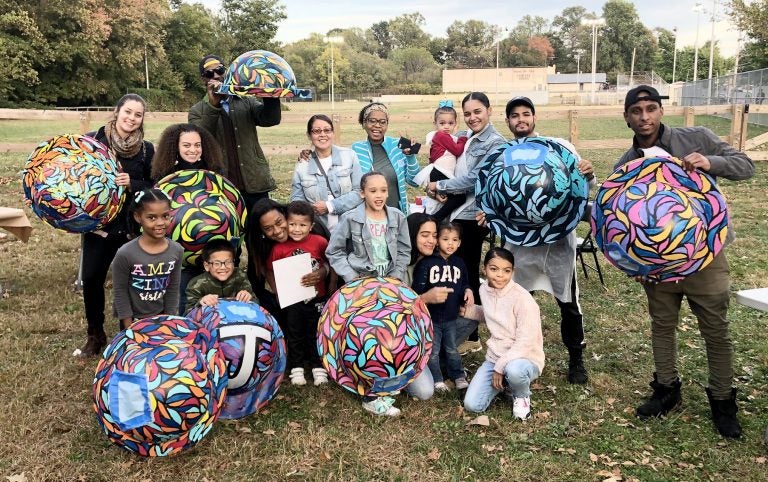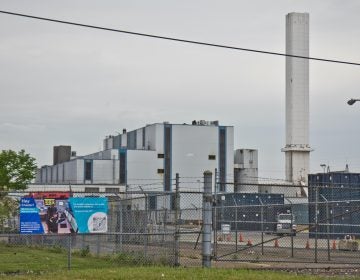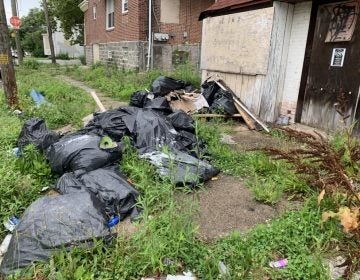Taking out the trash: City’s job or everyone’s responsibility?
Philadelphia’s litter czar opines on the role played by residents and partnerships as the city works to reduce the amount of trash in the streets.

Residents gathered in Juniata to paint the Community Cans. (Courtesy of the Zero Waste and Litter Cabinet)
Out of all of the accomplishments made by the Zero Waste and Litter Cabinet in 2019, I think my favorite may be the Community Cans Program. Not everyone agrees with me, I found out after the program launched in December.
The initiative is a partnership between the city and local groups to engage with community members and increase trash can coverage through deployment artist-designed cans.
After the launch of the Community Cans in Southwest and Juniata, many people took the opportunity to criticize local government for yet again passing the buck to residents. At one point, a community organizer turned to me and said, “It doesn’t sound like they’re talking about the same program.”
In fact, this innovative public/private partnership combines insights from the city’s litter index and the Cabinet’s behavioral experiments to strategically deploy trash cans in neighborhoods. To operate this program, the city partners with Community Development Corporations (CDCs), Business Improvement Districts (BIDs), private sector partners, and community organizations to supplement the thousands of city-managed trash cans located across the city.
I would like to take this opportunity to set the record straight on this program and explore what I think is the larger philosophical issue of personal responsibility versus government responsibility.
Myth #1: The Community Cans program relies on unpaid volunteers to maintain the cans
Yes, it is true that the program is designed to partner with established community organizations that do this work. However, all participating groups have volunteered to take part in the program and have the resources and staff capacity in place to maintain the cans. If they do not, the city will consult with each group to optimize the placement of each can and figure out a maintenance plan. In the Southwest, ACANA is one of the many CDCs or other community groups that the Commerce Department funds to clean commercial corridors. Their paid staff will primarily service the cans along Woodland Avenue. In Juniata, the Tookany/Tacony-Frankford Watershed Partnership is working with community partners and businesses to empty their cans.

Additionally, the program is supplemented by a city law stating that all vendors selling prepared or packaged food must provide an outdoor trash can for public use. Passed in 2015, this law has been a major resource for the Cabinet. It mandates that businesses that create a large amount of waste through “to-go culture” be part of the solution to prevent that waste from becoming litter. Since these businesses are required to put out trash cans anyway, why not utilize the Community Cans program?
Myth #2: This is privatization of trash collection and abandonment of city government responsibility
This criticism stealthily implies that the city is completely putting the responsibility of trash collection on the private or residential sector. What it fails to acknowledge is that the city manages thousands of waste receptacles in our parks and on our commercial corridors.
We have acknowledged that public trash can coverage is an issue in the city, and we are working on it. It will take the city, community, and the private sector working together to increase coverage and improve cleanliness. Other peer Cities such as Los Angeles have similar partnerships with businesses to help maintain trash cans. Businesses and corridor managers must take responsibility for trash that is being produced from their operations, and the Community Cans program finds a collaborative way to achieve that goal.
Myth #3: It’s the city’s responsibility to manage trash, not residents’
This is a constant refrain from people that expect city government to serve as a 24-hour concierge service to their every need. A city is not a hotel or an amusement park. It’s a place where people live in communities and create interdependent relationships to realize the common good through collective action because living in a dense urban environment requires nothing less. This includes city government working with businesses in these types of innovative partnerships to meet the needs of all residents.
All-in-all, the city alone cannot solve the trash and litter issue that we face. Staff can only service so many cans in one day and quite frankly can’t keep up with the amount of trash that is being generated in our current convenience culture. We need everyone working together to reduce what we consume to meet our goal of becoming a zero-waste city by 2035. The Cabinet will continue to engage and rely on the advice and insights of community members, business owners, and look to peers in our other cities for best practices.
We encourage Philadelphians to join us in these efforts, whether it is pitching us on your zero waste technology, certifying your business as zero waste, hosting community cans or learning more about our community composting program. We cannot do this alone.
Nic Esposito is the Zero Waste and Litter Director for the City of Philadelphia. Previously, he served as a PowerCorpsPHL project manager for Philadelphia Parks and Recreation and then as their Sustainability Manager. He was selected by the Managing Director’s Office to take on the challenge of creating a coordinated public and private sector plan to address Philadelphia’s litter problem, part of an effort to set Philadelphia on a path to Zero Waste by 2035. Nic is also the co-manager of Emerald Street Community Farm in Kensington where he lives with his wife and two sons.
WHYY is your source for fact-based, in-depth journalism and information. As a nonprofit organization, we rely on financial support from readers like you. Please give today.







